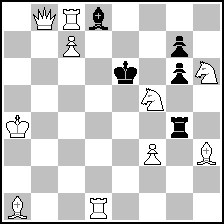|
|
| (1) Posted by seetharaman kalyan [Thursday, Sep 9, 2010 19:52] |
how many flights can a keymove give?
Can the key-move of a directmate twoer give more than 4 flights? I have seen several where the key gives 4 flights. In one especially nice problem the key gave all the four flights for a star-flight (but it had the drawback that black was in stalemate initially). Any problem beating that?
|
|
| (2) Posted by Dmitri Turevski [Thursday, Sep 9, 2010 20:30] |
W. Shinkman, Der Westen 1902
 (= 5+1 ) (= 5+1 )
#2
|
|
| (3) Posted by Paz Einat [Thursday, Sep 9, 2010 23:17]; edited by Paz Einat [10-09-09] |
WinChloe contains a total of 13 #2 with a key granting 5 flights and one problem with a key granting 6 flights...using a checking key. Since this seems to be the record I give it here:
Jaques FULPIUS
after Otto WURZBURG & William A. SHINKMAN
Le Journal de Genève 1972
 (= 10+5 ) (= 10+5 )
‡2 (10+5) C+
1.Sd4+! R~ 2.c×d8=Q‡
|
|
| (4) Posted by Sarah Hornecker [Friday, Sep 10, 2010 00:35] |
Actually, it is probably impossible to show a key that give six flights without check since there is no possible move that would protect the seven necessary fields for a mating move at once (the king's field and six around it).
However, maybe zugzwang can do even this miracle but I don't see how.
|
|
| (5) Posted by seetharaman kalyan [Friday, Sep 10, 2010 14:59]; edited by seetharaman kalyan [10-09-10] |
see my next post
|
|
| (6) Posted by seetharaman kalyan [Friday, Sep 10, 2010 15:45] |
@Dmitri, Pat.
Thanks for the problems. Actually I was trying a scheme giving five flights, but seeing the ancient problems quoted, will stop work on it!
@Seigfried
Actually a vertical Rook+P battery with a pawn promoting to queen capturing a black piece will guard the seven squares. But while it can be a threat, no variations can be worked on it (unless it is dummy black piece!!). However to force a non-checking key giving the six flights will be impossible.
|
|
| (7) Posted by Sarah Hornecker [Friday, Sep 10, 2010 16:07] |
Yes, I also realised in the meantime that it only works like in the diagram, because the front piece of the battery must also give a flight without taking one, so only a knight at this distance works.
|
|
| (8) Posted by Hauke Reddmann [Saturday, Sep 11, 2010 15:54] |
Oh, the dummy wouldn't be the problem - in the Fulpius problem,
replace the bishop d8 by a knight and add pawns on b7 c6 f7. See?
Artificial knight dummy. :-)
Hauke
|
|
| (9) Posted by David Knezevic [Saturday, Sep 11, 2010 18:36] |
This seems to be a pretty boring constructional task. A real challenge is to grant as much flights as possible and meet them with different mates. Here 5 seems to be the maximum like in the classic with mate on 6 squares by Ua Tane and a more subtle (quiet key!!) masterpiece by Michael McDowell.
Ua Tane
Good Companion 1918
 (= 12+6 ) (= 12+6 )
#2 (1.Sc4+)
Michael McDowell
The Problemist 1986
 (= 12+4 ) (= 12+4 )
#2 (1.Sce3!!)
|
|
| (10) Posted by seetharaman kalyan [Monday, Oct 25, 2010 21:56]; edited by seetharaman kalyan [10-10-25] |
Not even commendations for this wonderful problem by McDowel?
|
|
| (11) Posted by Hauke Reddmann [Wednesday, Oct 27, 2010 12:21] |
Everybody still in shock and awe :-)
Hauke
|
|
No more posts |
MatPlus.Net  Forum Forum  General General  how many flights can a keymove give? how many flights can a keymove give? |
 ISC 2024
ISC 2024 Forum
Forum  General
General  how many flights can a keymove give?
how many flights can a keymove give? 


